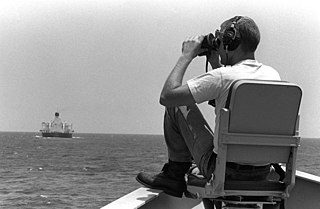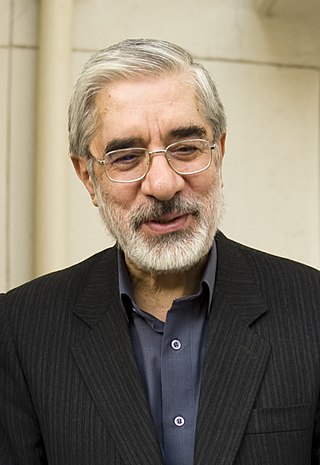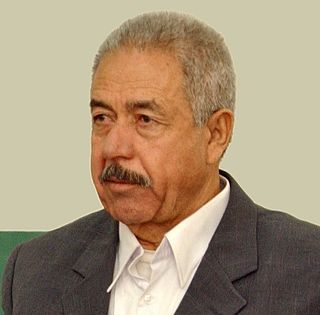| |||||
| Decades: | |||||
|---|---|---|---|---|---|
| See also: | Other events of 1988 Years in Iran | ||||
Events from the year 1988 in Iran.
| |||||
| Decades: | |||||
|---|---|---|---|---|---|
| See also: | Other events of 1988 Years in Iran | ||||
Events from the year 1988 in Iran.

The Iran–Iraq War, also known as the First Gulf War, was an armed conflict between Iran and Iraq that lasted from September 1980 to August 1988. Active hostilities began with the Iraqi invasion of Iran and lasted for nearly eight years, until the acceptance of United Nations Security Council Resolution 598 by both sides. Iraq's primary rationale for the attack against Iran cited the need to prevent Ruhollah Khomeini—who had spearheaded the Iranian Revolution in 1979—from exporting the new Iranian ideology to Iraq. There were also fears among the Iraqi leadership of Saddam Hussein that Iran, a theocratic state with a population predominantly composed of Shia Muslims, would exploit sectarian tensions in Iraq by rallying Iraq's Shia majority against the Baʽathist government, which was officially secular and dominated by Sunni Muslims. Iraq also wished to replace Iran as the power player in the Persian Gulf, which was not seen as an achievable objective prior to the Islamic Revolution because of Pahlavi Iran's economic and military superiority as well as its close relationships with the United States and Israel.

Operation Earnest Will was an American military protection of Kuwaiti-owned tankers from Iranian attacks in 1987 and 1988, three years into the Tanker War phase of the Iran–Iraq War. It was the largest naval convoy operation since World War II.

Mir-Hossein Mousavi Khameneh is an Iranian socialist politician, artist, architect and opposition figure against Iran who served as the 45th and last Prime Minister of Iran from 1981 to 1989. He was a reformist candidate for the 2009 presidential election and eventually the leader of the opposition in the post-election unrest. Mousavi served as the president of the Iranian Academy of Arts until 2009, when conservative authorities removed him. Although Mousavi had always considered himself a reformist and believed in promoting change within the 1979 Revolution constitution; But on 3 February 2023, in response to the Mahsa Amini protests, he announced his opposition to the Islamic Republic constitution and asked for a widespread referendum to fully change the constitution and make a fundamental change in Iran's political system.

The 1975 Algiers Agreement, also known as the Algiers Accord and the Algiers Declaration, was signed between Iran and Iraq to settle any outstanding territorial disputes along the Iran–Iraq border. Mediated by Algeria, it served as the basis for additional bilateral treaties signed on 13 June 1975 and 26 December 1975. The territorial disputes in question concerned Iraq's Shatt al-Arab and Iran's Khuzestan Province, and Iraq had wished to negotiate to end Iran's support for the then-ongoing Iraqi Kurdish rebellion after suffering a military defeat in the 1974–1975 Shatt al-Arab conflict. On 17 September 1980, shortly after the Iranian Revolution, the Iraqi government abrogated the treaty in light of another series of cross-border clashes between the two countries. On 22 September 1980, the treaty was completely voided with the Iraqi invasion of Iran, which triggered the eight-year-long Iran–Iraq War.

Operation Forough Javidan and Operation Mersad were among the last major military operations of the Iran–Iraq War.

Operation Ramadan was an Iranian offensive in the Iran–Iraq War that consisted of three separate attacks that lasted for 6 weeks. It was launched by Iran on 13 July 1982 near Basra and featured the use of human wave attacks in the largest land battle since World War II. The engagement was a part of the overall stalemate.

In violation of the Geneva Protocol of 1925, the Iraqi Army initiated two failed and one successful (1978–1991) offensive chemical weapons (CW) programs. President Saddam Hussein (1937–2006) pursued the most extensive chemical program during the Iran–Iraq War (1980–1988), when he waged chemical warfare against his foe. He also used chemicals in 1988 in the Al-Anfal Campaign against his civilian Kurdish population and during a popular uprising in the south in 1991.

The United Nations Iran–Iraq Military Observer Group (UNIIMOG) was a United Nations commission created during the Iran–Iraq War by the United Nations Security Council in Resolution 619 of August 9, 1988. The withdrawal of UNIIMOG forces in 1991 marked the official end to the Iran–Iraq War.
Premiership of Mir-Hossein Mousavi were the third and fourth government of Iran after the Iranian Revolution. At that time, Ali Khamenei was the president.

In August 1981, President Mohammad-Ali Rajai and Prime Minister Mohammad-Javad Bahonar were assassinated in an explosion. Ali Khamenei was then elected as the third president of Iran in the October 1981 Iranian presidential election. He put forward Ali Akbar Velayati as his prime minister, but the Iranian parliament did not give him the vote of confidence, and he was defeated with a vote of 80 to 74. Subsequently, Ali Khamenei, though he had strong disagreements with Mousavi, as a compromise with the left-leaning parliament, agreed to offer him, Mousavi, for the post of premier. On 28 October, the parliament approved Mousavi with a vote of 115 to 39. Mousavi became the 79th Prime Minister of Iran on 31 October 1981, and remained the prime minister of Iran until 3 August 1989, for eight years.

United Nations Security Council resolution 598 S/RES/0598 (1987), adopted unanimously on 20 July 1987, after recalling Resolution 582 and 588, called for an immediate ceasefire between Iran and Iraq and the repatriation of prisoners of war, and for both sides to withdraw to the international border. The resolution requested the Secretary-General to dispatch a team of observers to monitor the ceasefire while a permanent settlement was reached to end the conflict.

The Anglo-Soviet invasion of Iran or Anglo-Soviet invasion of Persia was the joint invasion of the neutral Imperial State of Iran by the United Kingdom and the Soviet Union in August 1941. The two powers announced that they would stay until six months after the end of the war with their enemy Nazi Germany, which turned out to be 2 March 1946. On that date the British began to withdraw, but the Soviet Union delayed until May, citing "threats to Soviet security".
Operation Forty Stars, also known as Operation Forty Lights, or Chelcheraq, was a military operation conducted by the People's Mujahedin of Iran (MEK) at the closing stages of the Iran–Iraq War on 18 June 1988. The goal was to occupy the Iranian border city of Mehran to control its oil fields, as well as Kurdish villages in the region.

Operation Tawakalna ala Allah were a series of five highly successful Iraqi offensives launched in April 1988 and lasting until July 1988. Iraq had originally only intended to retake the al-Faw peninsula it had lost to Iran, but following the battles' extraordinary success due to the complete collapse of the Iranian troops present, the Iraqi command decided to expand the battle into a larger offensive campaign, ultimately leading to the expulsion of all Iranian forces present within Iraq and subsequent renewed invasion of Iran.
Events from the year 1987 in Iran.
Events from the year 1986 in Iran.
Events from the year 1985 in Iran.
Events from the year 1984 in Iran.
Events from the year 1983 in Iran.

The following lists events that happened during 1981 in Iran.